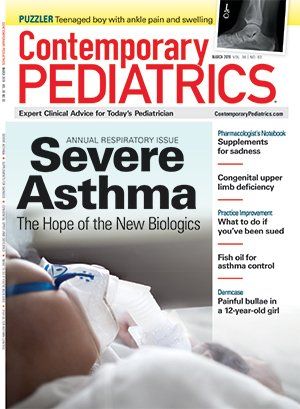Too few teenagers are screened for depression
Whereas rates of screening for adolescent major depressive disorder (MDD) have increased in recent years, they still are insufficient to address the current mental health crisis among adolescents, an analysis of countrywide data for 413,080 12- to 14-year-olds showed.
Michael G Burke, MD

Whereas rates of screening for adolescent major depressive disorder (MDD) have increased in recent years, they still are insufficient to address the current mental health crisis among adolescents, an analysis of countrywide data for 413,080 12- to 14-year-olds showed. Almost half (49%) of the teenagers, who maintained uninterrupted private insurance from 2010 to 2014, were female and most lived in urban areas. Only 1.8% of the study group had MDD screening at least once during the 4-year study period (in the context of well-visit care), although rates increased every year and ranged from 0.14% in 2010 to 0.77% in 2014. During this period, 12.8% of the adolescents in the data set were diagnosed with depression.
Analysis showed that those who lived in urban areas were twice as likely to receive MDD screening, which also was more common among adolescents who had a conduct disorder or had more well visits. Reduced likelihood of screening was associated with advancing adolescent age, living in the Midwest, and poor continuity of care. Being at high risk for depression-for example, because of a family history of depression-did not increase the likelihood of being screened (Sekhar DL, et al. J Pediatr. 2019;204:203-207).
Thoughts from Dr Burke
In March 2018, the AAP recommended annual universal depression screening of children aged 12 years and older at health maintenance visits (Pediatrics. 2018;141[3]:e20174081). This study looked at billing data for children with private insurance from 2010 to 2014 and showed that either few patients were screened or that few physicians who did screen for depression used the ICD-10 billing code to indicate that they did so. I suspect the latter. Nonetheless, this study is a reminder that we need to be looking for depression in our patients and know how to manage or refer when the screen is positive.
